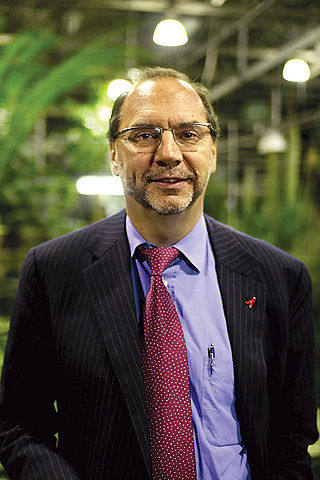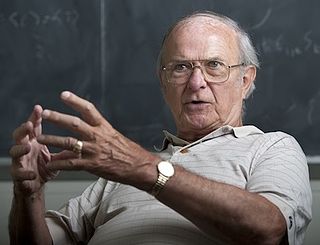Related Research Articles

Peter Ware Higgs is a British theoretical physicist, Emeritus Professor at the University of Edinburgh, and Nobel Prize laureate for his work on the mass of subatomic particles.

The Royal Society of Edinburgh (RSE) is Scotland's national academy of science and letters. It is a registered charity that operates on a wholly independent and non-partisan basis and provides public benefit throughout Scotland. It was established in 1783. As of 2021, there are around 1,800 Fellows.

Sir Peter Karel, Baron Piot, is a Belgian-British microbiologist known for his research into Ebola and AIDS.

Sir Thomas Walter Bannerman Kibble was a British theoretical physicist, senior research investigator at the Blackett Laboratory and Emeritus Professor of Theoretical Physics at Imperial College London. His research interests were in quantum field theory, especially the interface between high-energy particle physics and cosmology. He is best known as one of the first to describe the Higgs mechanism, and for his research on topological defects. From the 1950s he was concerned about the nuclear arms race and from 1970 took leading roles in promoting the social responsibility of the scientist.

Brian Edward Cox is an English physicist and former musician who is a professor of particle physics in the School of Physics and Astronomy at the University of Manchester and The Royal Society Professor for Public Engagement in Science. He is best known to the public as the presenter of science programmes, especially BBC Radio 4’s The Infinite Monkey Cage and the Wonders of... series and for popular science books, such as Why Does E=mc²? and The Quantum Universe.

François, Baron Englert is a Belgian theoretical physicist and 2013 Nobel Prize laureate.

Christopher Michael Bishop is a British computer scientist. He is a Microsoft Technical Fellow and Director of Microsoft Research AI4Science. He is also Honorary Professor of Computer Science at the University of Edinburgh, and a Fellow of Darwin College, Cambridge. Chris was a founding member of the UK AI Council, and in 2019 he was appointed to the Prime Minister’s Council for Science and Technology.

Carl Richard Hagen is a professor of particle physics at the University of Rochester. He is most noted for his contributions to the Standard Model and Symmetry breaking as well as the 1964 co-discovery of the Higgs mechanism and Higgs boson with Gerald Guralnik and Tom Kibble (GHK). As part of Physical Review Letters 50th anniversary celebration, the journal recognized this discovery as one of the milestone papers in PRL history. While widely considered to have authored the most complete of the early papers on the Higgs theory, GHK were controversially not included in the 2013 Nobel Prize in Physics.
Richard J. Hobbs FAA, is a distinguished professor, ARC Australian Laureate Fellow and ecologist at the University of Western Australia, Perth, Australia. He is a fellow of the Australian Academy of Science and a Highly-Cited author who has written extensively in the areas of vegetation dynamics and management, ecosystem fragmentation, ecosystem rehabilitation and restoration, landscape ecology, and conservation biology. Current research focuses on managing ecosystems in a rapidly changing world.

Lyn Evans CBE, is a Welsh scientist who served as the project leader of the Large Hadron Collider in Switzerland. Based at CERN, in 2012 he became the director of the Linear Collider Collaboration, an international organisation managing development of next generation particle colliders, including the International Linear Collider and the Compact Linear Collider.

Fabiola Gianotti is an Italian experimental particle physicist who is the current and first woman Director-General at CERN in Switzerland. Her first mandate began on 1 January 2016 and ran for a period of five years. At its 195th Session in 2019, the CERN Council selected Gianotti for a second term as Director-General. Her second five-year term began on 1 January 2021 and goes on until 2025. This is the first time in CERN's history that a Director-General has been appointed for a full second term.

Bikash Sinha was an Indian physicist who was active in the fields of nuclear physics and high energy physics. Sinha was the director of the Saha Institute of Nuclear Physics and Variable Energy Cyclotron Centre and the chairman of the Board of Governors of the National Institute of Technology, Durgapur in June 2005. He was also a member of scientific advisory board to the Prime Minister of India.

Guido Tonelli is an Italian particle physicist who was involved with the discovery of the Higgs boson at the Large Hadron Collider. He is a professor of General Physics at the University of Pisa (Italy) and a CERN visiting scientist.

Sir Tejinder Singh Virdee,, is a Kenyan-born British experimental particle physicist and Professor of Physics at Imperial College London. He is best known for originating the concept of the Compact Muon Solenoid (CMS) with a few other colleagues and has been referred to as one of the 'founding fathers' of the project. CMS is a world-wide collaboration which started in 1991 and now has over 3500 participants from 45 countries.
Peter Ignaz Paul Kalmus, is a British particle physicist, and emeritus professor of physics at Queen Mary, University of London.

Sau Lan Wu is a Chinese American particle physicist and the Enrico Fermi Distinguished Professor of Physics at the University of Wisconsin-Madison. She made important contributions towards the discovery of the J/psi particle, which provided experimental evidence for the existence of the charm quark, and the gluon, the vector boson of the strong force in the Standard Model of physics. Recently, her team located at the European Organization for Nuclear Research (CERN), using data collected at the Large Hadron Collider (LHC), was part of the international effort in the discovery of a boson consistent with the Higgs boson.

Peter Jenni, is an experimental particle physicist working at CERN. He is best known as one of the "founding fathers" of the ATLAS experiment at the CERN Large Hadron Collider together with a few other colleagues. He acted as spokesperson of the ATLAS Collaboration until 2009. ATLAS is a world-wide collaboration which started in 1992 involving roughly 3,000 physicists at 183 institutions in 38 countries. Jenni was directly involved in the experimental work leading to the discoveries of the W and Z bosons in the 1980s and the Higgs boson in 2012. He is (co-)author of about 1000 publications in scientific journals.

Mary Oyiela Abukutsa-Onyango is a humanitarian and agricultural scientist from Kenya who specializes in olericulture, agronomy, plant physiology. Abukutsa-Onyango is a professor of horticulture at Jomo Kenyatta University of Agriculture and Technology whose work focuses on African indigenous food crops. Abukutsa Onyango has studied how African indigenous vegetables can be used to combat malnutrition in Africa while maintaining a secure form of revenue even during more challenging weather and climate.

Victoria Jane Martin is a Scottish physicist who is Professor of Collider Physics at the University of Edinburgh. She works on the ATLAS experiment on the Higgs boson.

Mikhail Yevgenyevich Shaposhnikov is a Soviet-born Swiss theoretical physicist and a professor at École Polytechnique Fédérale de Lausanne (EPFL). He is active in the fields of cosmology and particle physics.
References
- ↑ "Edinburgh Medal - Edinburgh International Science Festival - Edinburgh International Science Festival". Edinburgh International Science Festival.
- ↑ Allison, Katy. "Medal for medical pioneer". www.edinburgh.gov.uk.
- ↑ "Edinburgh Medal - Edinburgh International Science Festival - Edinburgh International Science Festival". Edinburgh International Science Festival.
- ↑ "Edinburgh science festival to explore tech dangers". 16 February 2017.
- ↑ https://www.pressreader.com/uk/sunday-herald/20170409/281668254833884 – via PressReader.
{{cite web}}: Missing or empty|title=(help) - ↑ Kerr, Sally. "An astronomical inspiration: The Edinburgh Medal 2016 - Lord Provost's blog". www.edinburgh.gov.uk.
- ↑ "South African Government News Agency". SAnews. 8 February 2016. Retrieved 2018-05-04.
- ↑ "Interview: Philosopher Mary Midgley - thinker, writer ... and nemesis of the selfish gene". HeraldScotland.
- ↑ "Edinburgh Medal Address: Scientism". edinburghfestival.list.co.uk.
- ↑ "Prof Mary Abukutsa-Onyango wins 2014 Edinburgh Medal". kenyanwomenprofessors.blogspot.co.uk. 16 April 2014.
- ↑ "Professor Peter Higgs to get Edinburgh Medal".
- ↑ "Professor Peter Higgs awarded the Edinburgh Medal".
- ↑ "US climate change scientist awarded Edinburgh Medal".
- ↑ "Edinburgh Medal for Pill inventor". BBC News. 8 April 2011.
- ↑ Wilkie, Stephen (13 April 2022). "Edinburgh Medal recipient helps to save the world's declining gorilla population". Edinburgh News. Retrieved 13 April 2022.